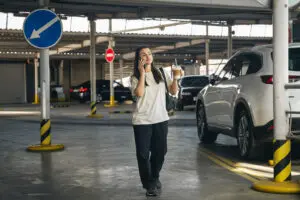What Is a Wrongful Death vs Survival Action?
Losing a loved one is always incredibly painful, but losing someone tragically and unexpectedly due to someone else’s negligence can seem impossible to navigate. If your family member was a key financial supporter of your household, your grief is likely being compounded by extreme financial stress. You may be wondering how you can put your family member or spouse to rest, pay off their medical bills, and keep your household afloat, but you may have legal recourse through wrongful death or survival claims. At Munley Law, our wrongful death attorneys can walk you through your options to seek justice for your deceased family member and obtain financial support.
Understanding Wrongful Death Claims
A wrongful death claim is a type of lawsuit that serves to compensate a deceased person’s family members for the loss they have suffered as a result of their loved one’s death, […]
Read MoreParking Lot Pedestrian Accidents
Being hit by a car as a pedestrian can leave you seriously injured. You might expect this type of accident to happen in a crosswalk or other such setting. However, a parking lot can also be the setting of a harmful pedestrian accident.
Have you been injured as a pedestrian in a parking lot? You may be eligible for compensation if so. Contact Munley Law today for a free consultation.
The Hidden Dangers: Parking Lot Accident Statistics
 A parking lot may not seem hazardous for a pedestrian. Unfortunately, parking lot accidents involving pedestrians are more common than you may realize. According to a report from a Bureau of Labor Statistics economist who studied the data, approximately 13% of all parking lot accidents involve pedestrian death. The National Safety Council has also tracked a fairly consistent rate of car accidents involving pedestrians in parking lots. […]
A parking lot may not seem hazardous for a pedestrian. Unfortunately, parking lot accidents involving pedestrians are more common than you may realize. According to a report from a Bureau of Labor Statistics economist who studied the data, approximately 13% of all parking lot accidents involve pedestrian death. The National Safety Council has also tracked a fairly consistent rate of car accidents involving pedestrians in parking lots. […]
Posted in Munley News.
Tagged Claim Damages Economic Damages Fault Insurance Liability Loss Negligence Pain and Suffering Parties Quality of Life
Why Are There Black Stripes on School Buses?
 Have you ever found yourself stuck behind a bright yellow school bus, your eyes wandering across its familiar features while waiting for the traffic to move? If so, you’ve probably noticed those distinctive black stripes running along its sides. They might seem like simple decorations, but these stripes – known in the transportation world as “rub rails” – play a fascinating role in keeping our children safe. As personal injury attorneys, we often come face to face with safety issues, particularly when it comes to protecting our children. These unassuming black lines are clever safety features that serve multiple life-saving purposes.
Have you ever found yourself stuck behind a bright yellow school bus, your eyes wandering across its familiar features while waiting for the traffic to move? If so, you’ve probably noticed those distinctive black stripes running along its sides. They might seem like simple decorations, but these stripes – known in the transportation world as “rub rails” – play a fascinating role in keeping our children safe. As personal injury attorneys, we often come face to face with safety issues, particularly when it comes to protecting our children. These unassuming black lines are clever safety features that serve multiple life-saving purposes.
What Are the Black Stripes on School Buses Called?
The black stripes you see on the sides of school buses are commonly known as “rub rails.” These protective black rails are an essential feature of school bus design. Typically made from rubber or plastic, […]
Read MorePosted in Munley News.
Tagged Parties
What Can a Lyft Car Accident Lawyer in Scranton Do for Me?
If you’ve ever been involved in a Lyft accident, you know how overwhelming and confusing the aftermath can be. From dealing with injuries and medical bills to navigating insurance claims, it can be difficult to handle on your own. That’s where a Scranton Lyft accident lawyer comes in.
How Does Hiring a Lyft Accident Lawyer Differ From Hiring a Regular Personal Injury Lawyer?
 When hiring a personal injury lawyer after a Lyft accident, you may be wondering if you should hire a regular personal injury lawyer or a lawyer specializing in Lyft accidents. While both types of lawyers can handle personal injury cases, there are some key differences to consider.
When hiring a personal injury lawyer after a Lyft accident, you may be wondering if you should hire a regular personal injury lawyer or a lawyer specializing in Lyft accidents. While both types of lawyers can handle personal injury cases, there are some key differences to consider.
A Lyft accident lawyer has specific expertise and experience in car accidents involving rideshare services. They understand the unique challenges and complexities that can arise in these cases. They are familiar with the laws and regulations that govern Lyft and the responsibilities of the driver, […]
Read MorePosted in Munley News.
Pennsylvania Product Liability Lawyer
Consumers have a reasonable right to expect their products to be safe to use as advertised. Product liability law protects consumers hurt by unsafe products and holds negligent manufacturers and retailers accountable. If you’ve suffered an injury or illness because of a dangerous product, a Pennsylvania product liability lawyer at Munley Law can help you get the justice you deserve. We have successfully handled numerous cases against industrial manufacturers, automotive companies, medical device makers, and other big companies whose products caused harm.
Contact us today for a free consultation. We do not get paid unless we win your case.
What Is a Product Liability Claim?
 A product liability claim is a legal claim brought against a product manufacturer, distributor, supplier, or retailer that caused a consumer injury or harm due to a defect or failure in the product. These claims are based on the principle that manufacturers and sellers must ensure their products are safe. […]
A product liability claim is a legal claim brought against a product manufacturer, distributor, supplier, or retailer that caused a consumer injury or harm due to a defect or failure in the product. These claims are based on the principle that manufacturers and sellers must ensure their products are safe. […]









